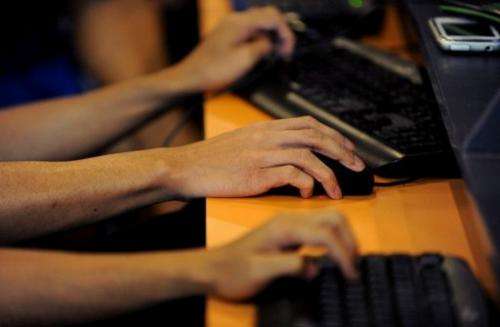Customers use computers at an Internet cafe in Manila on February 1, 2013.
Calls mounted Sunday for stiffer US action against Beijing for cyber spying and massive theft of US industrial secrets, allegedly by the Chinese military.
Mike Rogers, the chairman of the House Intelligence Committee, said it was "beyond a shadow of a doubt" that the Chinese military was behind a growing wave of hacking attacks on US businesses and institutions.
"They use their military to steal intellectual property from American businesses and European businesses, repurpose it, and compete in the international market against the United States," he said.
"It's unprecedented," he said on ABC's This Week. "And I'll tell you, it's bad as I have ever seen it. It's getting worse. Why? There's no consequence for it."
In the most detailed account yet of the cyber spying, a report this week by the Mandiant security firm said it traced back attacks by one group of hackers to a building on the outskirts of Shanghai that houses a unit of the Peoples Liberation Army.
The report said the hackers, known as "APT1" or "Comment Crew," had stolen data from at least 141 organizations across 20 industries.
Last month the New York Times and other American media outlets reported they had come under hacking attacks from China, and a US congressional report last year named the country as "the most threatening actor in cyberspace."
China has called the charges "groundless," and state media has accused Washington of scapegoating Beijing to deflect attention from US economic problems.
Eliot Engel, the top Democrat in the House Foreign Affairs Committee, said US lawmakers raised the issue with top Chinese officials during a recent visit to Beijing.
"And they just let it roll off their back. They pooh-pooh it. They don't admit to it," he said on ABC.
But he said it was "fundamental" to the US relationship with the Chinese.
"I think we have to make it very clear to them that this cannot be business as usual. If they're going to continue to do this to the extent that they're doing it, there's a price to pay," he said.
Rogers drew a distinction between cyber espionage to steal state secrets, which he said all states engage in, and the theft of blueprints and industrial secrets from US companies for economic reasons.
He said the United States should respond by "indicting bad actors," and suggested that Washington deny visas to individuals in China who are involved in the hacking and their families.
"I'm arguing let's start the indictment process to send a message to China that you cannot, if you want to be an international player, you can't act like a thief in the night," he said.
(c) 2013 AFP





















